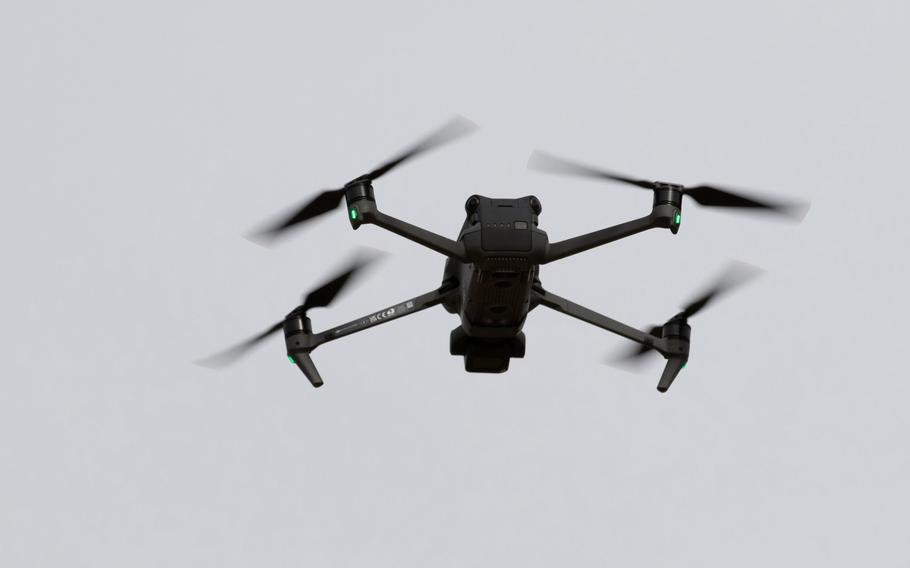
A drone hovers above the Joint Multinational Readiness Center in Hohenfels, Germany, in March 2024. In early December, unauthorized drones were spotted over Ramstein Air Base near Kaiserslautern, Germany, the 86th Airlift Wing said Monday. (Ayden Norcross/U.S. Army National Guard)
Germany is giving its armed forces the ability to shoot down unidentified drones suspected of spying on military bases, industrial facilities and other critical infrastructure, according to people familiar with the matter.
Chancellor Olaf Scholz’s cabinet is expected to pass a draft amendment to the Aviation Security Act on Wednesday. That will enable the military to use force against unmanned aerial vehicles in order to prevent a serious accident or attack, said the people, who spoke on the condition of anonymity as the plan is not yet public. Authorities previously relied on jamming transmitters to disable drones, but certain recent models appeared to be resistant to the technology.
Interior Minister Nancy Faeser and Defense Minister Boris Pistorius, both senior members of Scholz’s center-left Social Democrats, agreed on the measures after drones were spotted in restricted airspace near energy, telecommunications, transport and industrial factories across the country in recent weeks, the people said.
According to the people, the drones are likely being deployed by a state actor for purposes of sabotage and potentially terrorism. The draft amendment will not name any specific foreign country, they added, although authorities suspect that Russia and China are the prime culprits.
When asked about the matter Tuesday at a regular press briefing in Beijing, Chinese Foreign Ministry spokesman Guo Jiakun said he was unfamiliar with the specifics.
He added that his country “firmly opposes relevant sides making groundless speculations or smears against China without any factual basis.”
The Russian embassy in Germany didn’t immediately respond to a request for comment.
Under the amendment, local authorities will be able to ask the military to intervene and take action if such a step is deemed necessary, the people said. This would expand the current law, which stipulates that the armed forces can only open fire on foreign military aircraft under restricted circumstances.
A growing number of suspicious drones have been sighted near army barracks in recent weeks, including the US airbase in Ramstein. Several drones were seen flying over its runway at speeds of over 200 kilometers per hour.
German authorities assume that these were military drones not available on the consumer market, the people said. They added that the reason why Russia is believed to be responsible for the suspected espionage is because the drones have focused on German bases where Ukrainian soldiers receive military training.
The incidents do not represent Germany’s first encounter with unidentified drones. Last November, authorities flagged a suspicious drone near the British aircraft carrier Queen Elizabeth in the port of Hamburg. The aerial vehicle came so close to the ship that the German military took steps to deploy a jamming transmitter called “Effektor” HP-47 to use on the drone - which quickly buzzed off.
A significant number of suspicious drones have also been spotted around critical infrastructure in European countries including Sweden, the UK and the Baltic states in previous months. There has not been any clear explanation for these incidents, a person familiar with the matter said, asking to speak on the condition of anonymity. However, the person said, the activity eventually calmed down.
— With assistance from Alberto Nardelli, Colum Murphy and Philip Glamann.